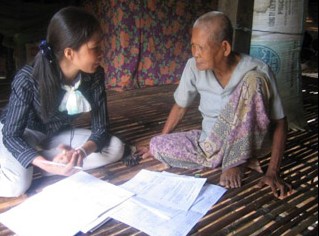|
|
Surviving Catastrophe: The Elderly in Cambodia
Population Council
Cambodia
January
2006

For a period that began in the early 1970s and lasted more than two decades, the Cambodian people were victims in turn of bloody civil war, genocide and starvation, and renewed civil war. During the reign of the Khmer Rouge between 1975 and 1979, an estimated 1.5 to 2 million people—more than 20 percent of the population—lost their lives. Today, Cambodians endure extreme poverty and one of the highest HIV infection rates in Asia. Many of the people who died during civil strife or because of HIV infection were the spouses, sons, and daughters of the current elderly population. Thus, in addition to having endured extreme trauma, these older people may now lack core family support. However, relatively little systematic data exist on the social and economic situation or the health of Cambodia’s elderly.
To fill this information gap, Population Council demographer Zachary Zimmer and University of Michigan researcher John Knodel collaborated with Cambodian researchers Kiry Sovan Kim and Sina Puch of the Royal University of Phnom Penh. The investigators conducted the 2004 Survey of Elderly in Cambodia, a representative survey of 1,273 people aged 60 and older living in the six most populous provinces, including Phnom Penh. This study is the first comprehensive examination of the lives of the Cambodian elderly based on a widely representative sample. To learn more about the impact of HIV infection, the researchers collected supplementary data from a nonrandom sample of 100 older Cambodians who lost children over the last five years as a result of HIV and other illnesses.
In addition to providing information about Cambodia’s elderly population, “one of our chief goals with this study is to strengthen the ability of Cambodian scientists to conduct social science research in their own country,” states Zimmer. The Khmer Rouge destroyed research capacity in Cambodia by eliminating academic institutions. The researchers, who are working closely with faculty at the Royal University of Phnom Penh, published three studies based on the survey data and have several more papers planned.
A history of violence
The survey revealed the devastation wrought during the short but lethal period of Khmer Rouge rule. More than 40 percent of Cambodians over the age of 60 lost at least one child, and close to 25 percent of the women lost a spouse in those four years. Despite this bitter legacy, almost all elderly Cambodians have living children, owing to a high fertility rate. In fact, older people in Cambodia today typically have more surviving children than do older people in Thailand, owing to a sharp decline in fertility in the latter country. The Cambodian elderly rely heavily on family support, usually living with children and receiving modest amounts of money and material goods from them.
The survey assessed health in a number of ways. For instance, it asked respondents about their ability to carry out four activities of daily living: eating, bathing, dressing, and getting up from lying down. Zimmer analyzed this data and compared it to similar data from Burma, Indonesia, the Philippines, and Thailand. He found that elderly people in Cambodia experience limitations in each of these activities at higher rates than found in any of the other four countries. Twenty-three percent of older Cambodians report difficulties with at least one of these activities, as compared with 10.5 percent of the elderly population in Burma, 9 percent in the Philippines, and even lower proportions in Thailand and Indonesia.
Using the information about activities of daily living, Zimmer calculated the “active life expectancy,” the expected remaining years of functional well-being, of elderly Cambodians. He found that women live longer than men but spend a greater proportion of their lives with disabilities. Not surprisingly, he found older age to be related to higher rates of limitation and less active lives.
“So far our research has shown that elderly Cambodians have faced harsh and traumatic circumstances, most notably war and extreme poverty, ” says Zimmer. “All of this has affected their quality of life. Their health is poor and their lives are difficult.”
The study results point to a need for greater recognition by the government and international aid agencies of the requirements of this hitherto largely ignored segment of the population.
Sources
Knodel, John, Sovan Kiry Kim, Zachary Zimmer, and Sina Puch. 2005. “Older persons in Cambodia: A profile from the 2004 Survey of Elderly,” Population Studies Center Research Report no. 05-576. Ann Arbor: University of Michigan. (offsite abstract) (offsite PDF)
Zimmer, Zachary. 2005. “Active life expectancy and functional limitations among older Cambodians: Results from a 2004 survey,” Policy Research Division Working Paper no. 201. New York: Population Council. (abstract) (PDF)
Zimmer, Zachary, John Knodel, Kiry Sovan Kim, and Sina Puch. 2005. “The impact of past conflicts and social disruption in Cambodia on the current generation of older adults,” Population Studies Center Research Report no. 05-582. Ann Arbor: University of Michigan. (offsite abstract) (offsite PDF)
Outside funding
The William and Flora Hewlett Foundation, the Andrew W. Mellon Foundation, the National Institute on Aging, the United Nations Population Fund/Cambodia, and the US National Institutes of Health
|
|



